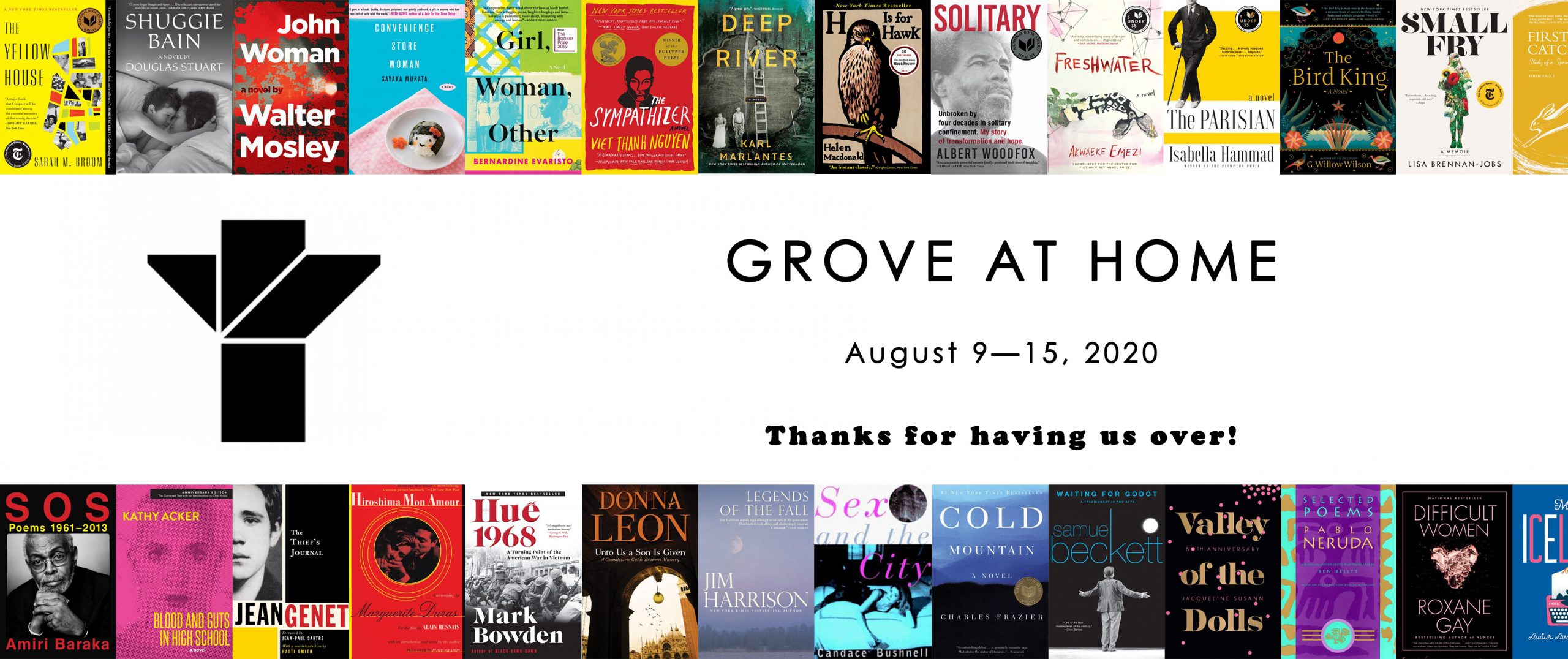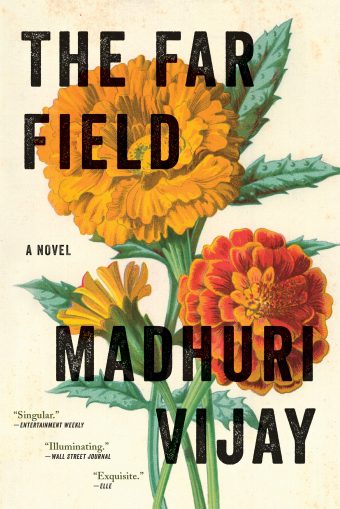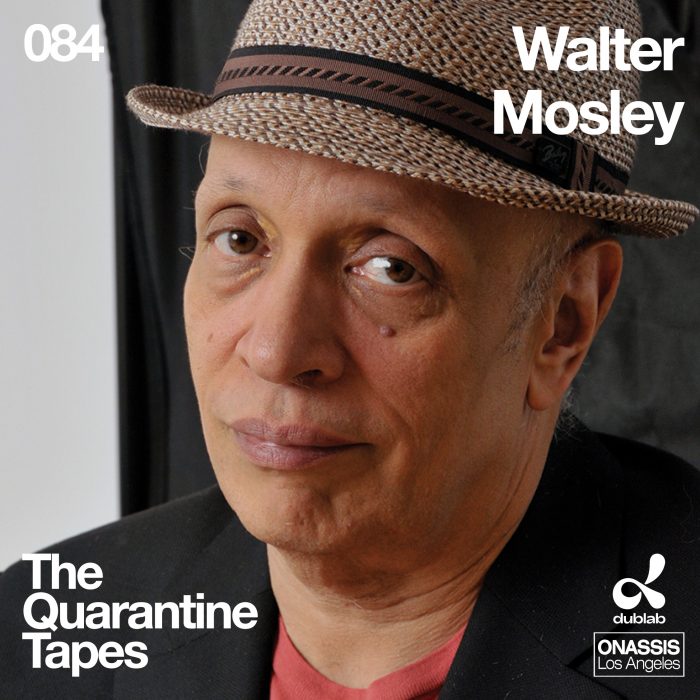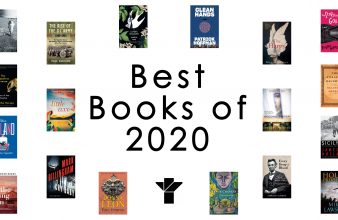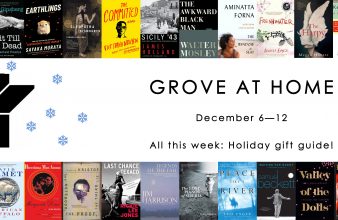News Room
Welcome to Grove at Home!
Every weekday, from now until we’re all out of the house again, we’ll be sharing a couple of links — some fresh, some from the vault — to say hi, remind you to keep reading, and let you know what’s on our minds.
Friday, August 14
Reading Private Means with Liz Phair, Bon Iver, Elton John, and friends
In a guest spot at David Gutowski’s much-loved blog Largehearted Boy, the wonderful Cree LeFavour, whose first novel, Private Means, we were delighted to publish this week, has done the seemingly impossible: she’s taken her sharp, literary, emotionally complex novel — which explores concerns that include the search for a lost dog, the challenges of keeping a marriage together for decades, and enduring the heat of a New York summer — and set it to music. It’s a fantastic playlist. You can listen right here, but do absolutely check out the full post, with Cree’s emotionally frank commentary on each song. And if you haven’t yet, don’t forget to read an excerpt from Private Means at The Common.
Read the full post with Cree’s song-by-song commentary…
John Freeman on the park, The Park, and the bookstore
How does John Freeman do it? A tireless writer, editor, and advocate for the written word, Freeman is the editor of Freeman’s, the aptly-named, book-length literary journal whose latest, love-themed issue is coming this fall with contributions from the likes of Tommy Orange, Anne Carson, and Olga Tokarczuk. He’s also a poet and essayist of rare accomplishment. In a bracing, short new piece at the Kenyon Review, Freeman writes about how we find — and read in — public spaces, especially that one public space so many of us are missing right now: the bookstore.
“Twice in my life, I’ve lived in neighborhoods oriented around a bookshop. The bookshop was the first place I went every day, just as you might go to a cafe at daybreak. Or visit a loved one on the way to work, calling up from the street. For some, the smell of morning is tea and toast; for me in those years, it was pages…” Continue reading…
These days, many of us will take some joy wherever we can get it. And many of us have long been getting it from the inimitable Steve Martin, who turns seventy-five today! Best known for his hilarious comedy and storied film career, Steve is also an accomplished musician, a bit of a philosopher, and an author who’s published more than ten books of fictions and plays, and who wrote the screenplays to some of his most popular movies, including L.A. Story, Roxane, Bowfinger, and others. Today, though, at a moment when many of us could use a laugh, we celebrate all of Steve’s accomplishments with this — one of his most beloved comedy routines, and one that was arguably viral avant la letter. May it keep us laughing through the weekend, and, Steve, may seventy-five be your best year yet.
Thursday, August 13
“Ideas of mimicry and seduction”: Anne Enright on the genesis of blame at the British Museum
Anne Enright has been called “the face of Irish literature,” an author whose many accolades include the Carnegie Medal for Excellence in Fiction, the Rooney Prize for Irish Literature, and, for her novel The Gathering, the 2007 Booker Prize. Two years ago, at the invitation of the London Review of Books, Enright appeared at the British Museum to discuss the origins and genealogy of blame, in a powerful talk that begins by quoting the Pope on fake news, and goes on to address the snake in Eden, the intersections of love and transgression, and so much more. “Hello, rib.”
Madhuri Vijay’s new story in the New Yorker
“I am thirty years old and that is nothing.” So begins The Far Field, the debut novel by Madhuri Vijay that we published it last year. It would go on to win the JCB Prize for Literature, among other honors. Reviewing the book, the New Yorker wrote, “Vijay probes grand themes—tribalism, despotism, betrayal, death, resurrection—in exquisite but unflowery prose, and with sincere sentiment but little sentimentality.” This week, Madhuri returns to the magazine’s pages — now as the author of an arresting short story, “You Are My Dear Friend.” You should read it immediately.
“On weekdays, her mornings were hers. The children went to an international school, and as long as she was at the gate by one-fifteen the Bakers didn’t care what she did. Besides Geeta, they employed a maidservant, a cook, and two drivers. The cook was old and beyond the nip of jealousy, and Geeta barely saw the drivers, but it was possible that the maidservant resented her for her relative freedom. To ward off any ill feeling, every so often Geeta brought home a trinket for the girl, who was a chatty, dimpled creature from Jharkhand. Geeta was from Odisha and had nothing in common with her, except the fact that people in Bangalore knew almost nothing about where either of them came from.” Continue reading…
“Perhaps I’m a romantic, but the only identity I feel entirely comfortable claiming is that of a writer”: Madhuri Vijay talks to Deborah Treisman
After reading Madhuri’s “You Are My Friend,” we recommend digging into the short, fascinating interview she gave with Deborah Treisman, the New Yorker’s fiction editor, about the story, The Far Field, the experience of being a South Indian, Tamilian, Bangalorean, Hindu, English-speaking, foreign-educated, female author who lives in Hawaii, and much more. It’s a quick read and extremely worth your attention.
“What does it mean for Geeta, culturally, to be a Catholic woman marrying a Brahmin?
“This is a hugely complicated question, and my answer is in no way intended to be comprehensive. India, despite the increasingly rabid attempts to make it otherwise, is a country inclined toward syncretism. Indian Christianity, in particular, derives many of its cultural rituals from Hinduism. There is also a long history of marginalized groups converting to Christianity (as well as Buddhism and Islam) to escape the oppressive Hindu caste system, but caste is tenacious and has seeped into certain Christian communities, despite its being in opposition to the teachings of Jesus.” Continue reading…
Wednesday, August 12
Claudia Rankine talks with Paul Holdengräber
Right now, many of us feel something unprecedented is happening in America, amid what the New York Times has called the largest social movement in US history. It’s hard to think of a voice on the subject more worth hearing than Claudia Rankine’s. As a poet and intellectual, Rankine has become indispensable to our national conversation. This week, she joined one of our foremost conversationalists — the mighty Paul Holdengräber, whose greatness we were discussing just yesterday — for a discussion about parenting, the conflict over mask-wearing, and, hardly least of all, about the protests that have coursed through America’s streets since May. Thanks to Literary Hub, you can listen right here:
An excerpt from Private Means, live at The Common
Yesterday, we had the joy of publishing Private Means, the first novel by acclaimed memoirist and food writer Cree LeFavour. It’s a keenly observed, masterfully cadenced study of a marriage weathering a long, hot summer. If you missed last night’s online conversation between Cree and New York Times critic Dwight Garner hosted by McNally Jackson, not to worry — you can catch the duo together this coming Tuesday, thanks to the Northshire Bookstore. And meantime, you can whet your palate with this fantastic excerpt from the book, published yesterday at The Common.
“The wine finally whittling at the burr of her thoughts, Alice read descriptions and assessed fabric content before selecting her size. Partial to leafy green and navy blue, cautious of dressing as a lamb when she knew she was close to mutton and yet not ready for Eileen Fisher–baggy old lady, her fifty-one years compounded the shopping challenge her considerable height posed. Even if she wasn’t actually buying, the clothes must potentially fit if the process were to give her any satisfaction.” Continue reading…
Said the couch potato skeleton, “What, me worry?”
However we’re feeling about the current news cycle, probably all of us could use a moment off from thinking about it. Just such a restorative break comes — with a hearty dose of satire and an incredible backing band that includes Paul McCartney, Philip Glass, and Lenny Kaye — in the video to Allen Ginsberg’s poem “The Ballad of the Skeletons,” which the New York Times once called “a jauntily righteous commentary on politics, the press, homosexuality and censorship, among other things,” and which, frankly, has hardly aged a day since it was recorded in 1996, a year before the beloved poet’s death.
Tuesday, August 11
Walter Mosley talks to Paul Holdengräber
Paul Holdengräber and Walter Mosley are both people of whom one might ask: How does he find the time? Walter is the author of more than fifty books, including the beloved Easy Rawlins series. His story collection The Awkward Black Man is coming next month, and has already gotten a starred review in Booklist. Holdengräber is a tireless literary gadabout — the former director of Live from the NYPL, the dialer (and brilliant interlocutor) of Literary Hub’s Phone Calls From Paul, an ace Twitter follow, and, now, the founding Executive Director of Onassis LA. It’s from Onassis LA and Dublab that Holdengräber has been hosting The Quarantine Tapes, a series of riveting conversations in which culture-makers check in on how they’re weathering the Covid pandemic. Paul’s conversation with Walter, which took place about two weeks ago, was one for the record books — they touch on free speech in the TV writers’ room, tearing down monuments, and, not least of all, John Woman, Mosley’s exhilarating 2018 novel of ideas.
From great books, great meals
A few years back over at Brainpickings, the tireless Maria Popova assembled a trove of photos from Dinah Fried’s Fictitious Dishes, her book collecting photos of recreated meals from great literature. We’re happy to see some good friends here — Jack Kerouac, you old so-and-so! — and especially glad to see Fried’s vision of one of the most memorable hot dogs in all literature, fashioned by John Kennedy Toole.
“A Confederacy of Dunces by John Kennedy Toole, 1980: ‘Stopping before the narrow garage, he sniffed the fumes from Paradise with great sensory pleasure, the protruding hairs in his nostrils analyzing, cataloging, categorizing, and classifying the distinct odors of the hot dog, mustard, and lubricant.’” Continue salivating reading…
“That’s kind of how this collection was born: I just leaned into an obsession”: Dantiel Moniz talks Milk Blood Heat
Last week, the wonderful folks at the American Library Association’s United for Libraries hosted an author tea, featuring seven brilliant with new books forthcoming. The first writer to speak? Alice Hoffman Prize-winner Dantiel Moniz, whose debut collection, Milk Blood Heat, we can’t wait to publish this winter. Dantiel starts with a childhood recollection: “I’m sitting there with my new library card trying to figure out which book I want to take, just agonizing over it. And this librarian comes up behind me and was like, ‘You know you can check out up to twenty books.’ My mom was maybe like, ‘Don’t tell her that!’ — but it was such a great moment for me.” She goes on to discuss where she’s from, her ambitions for the short story form, and a great deal more. “I wanted to see where I grew up represented on the page,” she explains.. All these authors are tremendously worth hearing! Dantiel begins, shortly after an introduction from resident Library Journal genius Barbara Hoffert, at the 7:54 mark.
Monday, August 10
From hearing Willie Nelson to redefining the Western: Lauren Francis-Sharma talks with Dolen Perkins-Valdez
“Well, we’re literary nerds! So tell her: get used to it, kid.” With this excellent advice for writers discussing their sartorial decisions with their children, Wench author Dolen Perkins-Valdez kicked off a phenomenal discussion with Book of the Little Axe author Lauren Francis-Sharma, hosted by Politics and Prose back in May. The conversation goes on from there — we spend some time with Edward Rose, the Black Indigenous man who became a Crow chief in the nineteenth century; Eric Williams, the prolific author who was also Trinidad and Tobago’s first prime minister; domestic gender dynamics in the age of Covid, and much more. Add in a Lauren’s phenomenal reading of an excerpt from the book, and this is the hour to start your week with. Trust us.
Darcey Steinke takes a few questions
We’re not lukewarm about Darcey Steinke: the brilliant author of Up Through the Water and Jesus Saves (both New York Times Notable Books), as well as Suicide Blonde (the most accomplished literary work ever to share its name with an INXS song), she’s one of our heroes. Darcey has a new one out now from Sarah Crichton Books, Flash Count Diary, and in an interview at Book Marks she reveals something of her tremendously broad reading, the advantages of being a preacher’s daughter and, oh yes, lack of love for Charles Dickens. Read this at once!
“BM: A book that blew your mind?
“DS: Kindred by Octavia Butler. This book is a stone cold masterpiece. The way, through a time travel plot, it connects slavery with the modern life of black and white people. You can understand that something is heinous, evil, wrong but still not get a feel for the emotional complexity and damage of something like slavery. I feel it is the rare book that has the power to change a reader.” Continue reading…
Having a Coke with Frank O’Hara
There’s a lot we could say to introduce this remarkable video, which is simultaneously a close-up look at some of Frank O’Hara’s poetry and a bracing meditation on the right kind of avocado salad to start your day with. But nothing we’re going to say will really prepare you — just watch it. And thanks to PBS Digital Studios, Sarah Urist Green, Kaveh Akbar, and Paige Lewis.
